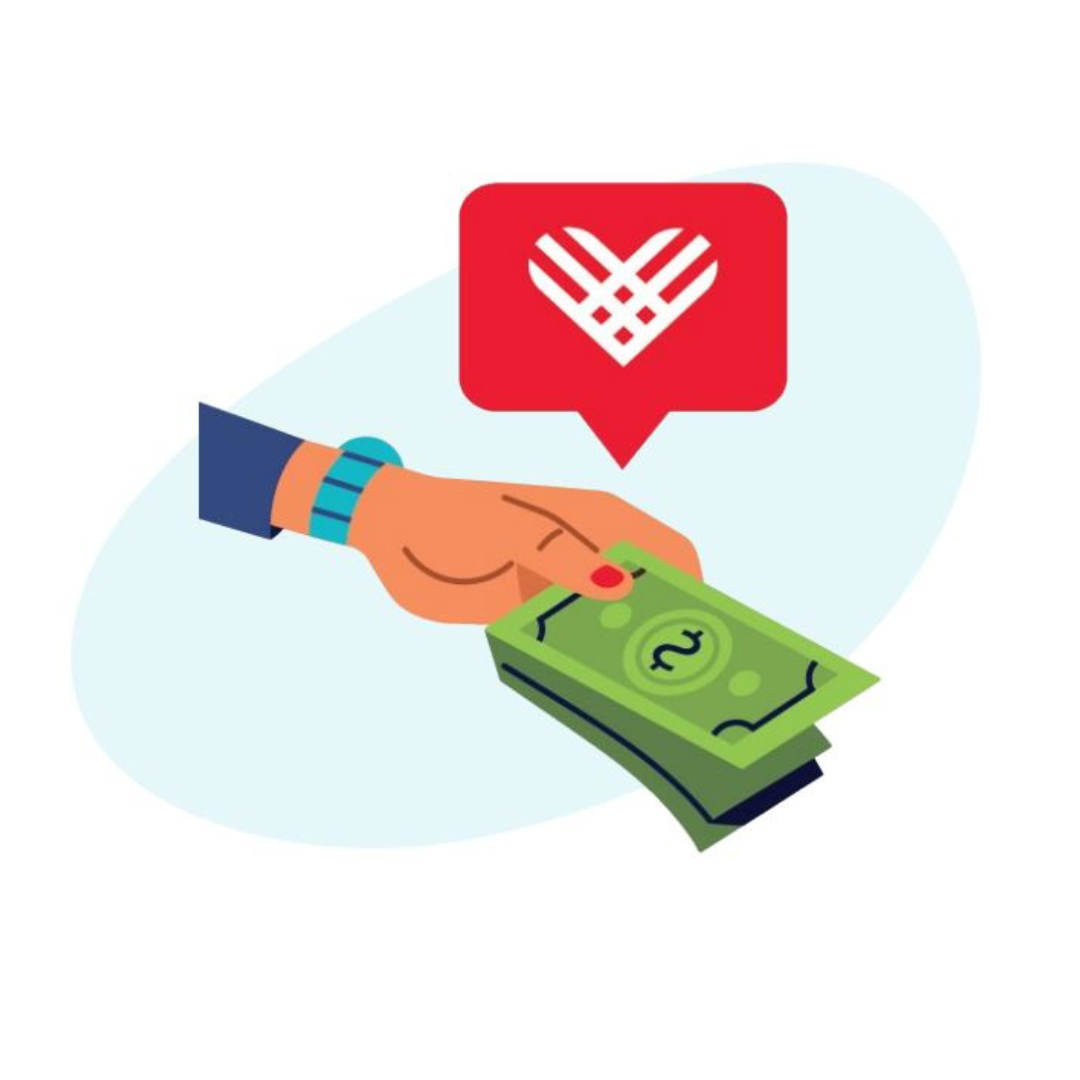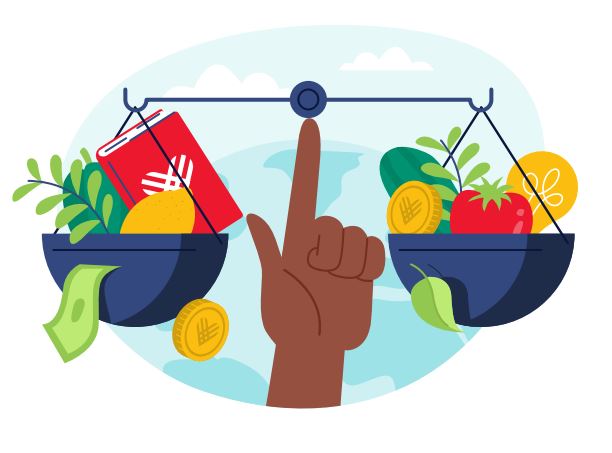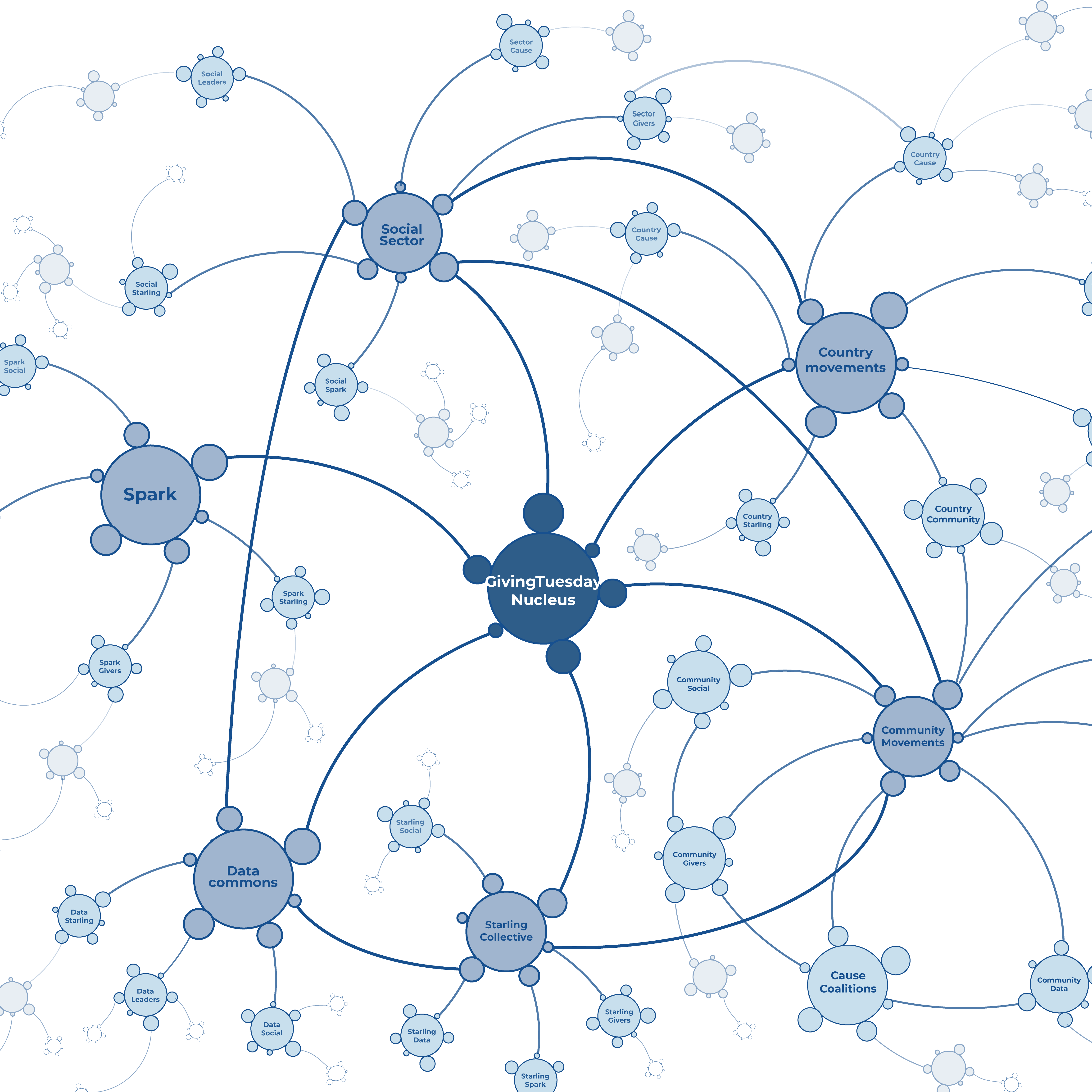
The GivingTuesday Data Commons investigates the nature of generosity globally using quantitative and qualitative methods. Our mission is to generate insights and new knowledge that can help create a more effective and evidence-driven social sector, capable of meeting the challenges of the twenty-first century.
With partners from across the sector, we help address the urgent need for data-based insights to support social sector organizations around the world. We also work to convene partners to address new issues and trends as they emerge and become relevant to the sector’s practices.
Within the GivingTuesday Data Commons and with the engagement of the GivingTuesday movement, we leverage our data, findings, collaborative research, and networks to create communities of learning and practice. These communities allow researchers, practitioners, and policymakers to work together to identify opportunities and test hypotheses to better understand the generosity ecosystem worldwide.
We have grouped our research priorities into three broad areas that offer real potential for practical application in the social sector.

Fundraising and resource mobilization are critical to how nonprofit actors fulfill their missions. Social good movements and organizations routinely face challenges in donor acquisition, retention, and relationship building while endeavoring to evaluate and demonstrate impact. Successful strategies need to be informed by a data-driven understanding of relationships and differences between institutional funding and individual giving, as well as the role that affected communities often play in mobilizing resources to solve the problems they face.
Through our datasets and collaborative research, the GivingTuesday Data Commons identifies best practices, innovative approaches, and emerging trends in fundraising as well as potential generosity-enabling technology and interventions. We do so by studying effective fundraising, macroeconomic impacts on giving, capital flows, and other sources of information on monetary aspects of giving. We also conduct research to better understand donor behavior and motivations through data-driven knowledge and field testing.
GOAL: To measure, describe, and share actionable research findings about successful fundraising practices through studies of fundraising data, campaign data, donor trends, and other relevant data sources.
The tactics, strategies, and techniques employed by social good organizations to raise funds for their causes and initiatives involves a systemic approach to attracting, engaging, and retaining donors to maximize contributions and achieve fundraising goals. We curate up-to-date datasets — such as those captured in the Fundraising Effectiveness Project (FEP) — to help identify the most successful strategies, analyze the diverse nonprofit landscape to recognize trends in donor behavior, and help build data driven strategies to better understand and deliver organizational impact. Our collaborative research helps derive industry benchmarks, gather actionable insights, and study the potential of rapidly evolving technologies in the philanthropic sector.
Economic headwinds play an important role in the health of the social sector. In theory, recessions and downturns limit the availability of institutional and individual resources for giving and can cause stress on nonprofit organizations at times when they are most needed. Wrestling with this reality and developing strategies to mitigate and circumvent these realities is therefore crucial. GivingTuesday’s collaborations explore how nonprofit organizations can become more resilient in the face of these economic realities, either through anticipating and managing headwinds or developing strategies to unlock generosity during economic crises.
Understanding the movement of financial resources in the philanthropic sector is crucial for promoting accountability, effectiveness, strategic resource allocation, and policy advocacy to contribute to positive social change. Through curation of datasets on philanthropic vehicles and data submitted to domestic revenue agencies, we both directly study and enables others to understand the movement of capital flows to provide insights into the motivations and preferences of donors, as well as the impact of large-scale donations on the philanthropic sector. Our collaborative research seeks to examine the movement of financial resources between organizations to help identify opportunities for partnerships, resource sharing, and knowledge exchange.
For nonprofit organizations, understanding donor behaviors and motivations is key to retention and relationship building. Gaining insights into the factors that influence donors can help organizations effectively allocate resources, personalize fundraising strategies, and effectively communicate with donors while building trust and commitment. Through tools such as GivingPulse — a weekly survey of US residents exploring a wide range of giving behaviors — we are generating insights into the psychological and sociological aspects of giving, time, money, or resources to philanthropic causes.

Generosity extends beyond financial donations to formal charitable organizations. Studying and capturing different forms of generosity and community-driven problem-solving in diverse cultures is crucial to understanding and leveraging its abundance. Broadening the sector’s perspective and acknowledging the full spectrum of giving is vital to exploring the linkages between generosity and social change. With the increasing rise of non-institutional approaches to philanthropy such as mutual aid networks, digital crowdfunding, and volunteerism, we are working to understand and measure a broad range of generosity practices. We help capture the various dimensions of giving to help social changemakers access a wider range of resources, foster deeper connections with supporters, and maximize their impact on social causes.
GOAL: To understand and articulate the intersectionalities of the generosity ecosystem beyond the scope of monetary donations and fundraising. This includes studying the drivers and influencers of giving, as well as understanding and classifying the giving ecosystem.
Within the philanthropic sector, many organizations are shifting to a more collaborative approach of providing support to communities by emphasizing solidarity and reciprocity while addressing challenges through shared efforts. By relying on voluntary participation and operating on the principle of collective action, mutual aid groups can provide a way for nonprofits to collaborate with grassroots actors to increase their overall impact while promoting equity and inclusivity. Through our research projects and collaborations, the GivingTuesday Data Commons aims to gain a deeper understanding of how mutual aid groups operate and how they can work in tandem with the philanthropic sector to improve their strategies, demonstrate impact, and foster more meaningful community engagement.
Volunteers are an invaluable resource to nonprofits as they offer their time, skills, and expertise without compensation. Engaging with volunteers increases the capacity and reach of an organization and helps maximize its impact. Studying and understanding volunteer behavior and outcomes can help the philanthropic sector assess the impact and effectiveness of volunteer-driven programs and better appreciate their contributions. Research into the social and economic value of volunteerism can support and provide evidence for policy development and advocacy efforts. GivingTuesday Data Commons research and datasets on volunteers — built with support from leading industry organizations — can help the sector optimize volunteer engagement, enhance program effectiveness, and maximize the value of volunteer contributions, leading to greater sector resilience and improved community well-being.
Civic engagement is a fundamental aspect of a thriving society and is deeply intertwined with the functions and activities of the social sector. We seek to understand the relationship between generosity and civic engagement. In particular, we aim to define criteria for measuring and tracking these and other enabling relationships over time. We monitor emerging trends to anticipate their potential impact on the future of philanthropy and civic participation, ensuring our insights remain relevant and proactive.
Identity is the lens through which people make sense of their world and beliefs form the core of one’s identity. The more we map the factors that help shape a person’s perspective and worldview, the better we can explain (and ultimately predict) trends in generosity. For example, the majority of humans have held strong religious beliefs throughout history, though the proportion has been declining in recent decades. This brings forth the question of what other ideologies are taking their place? Further, what are the implications of this shift for prosocial behavior? This remains an important and relevant open research question for GivingTuesday.
Demographic shifts can greatly influence donor preferences and behaviors. Studying these trends helps illustrate evolving motivations, interests, and giving patterns of different demographic groups while shedding light on marginalized voices and groups who have traditionally been sidelined by the nonprofit sector. By building datasets the GivingTuesday Data Commons conducts and enables research that addresses disparities in equity and inclusion and helps nonprofits better engage in new and emerging donor segments to meet evolving social needs.

Under this theme, we are investigating our own organization to discover lessons that are valuable not only for the progression of the GivingTuesday movement but also for others interested in building similar types of structures. In recent years, the digital revolution has brought new kinds of organizations and networks into being which have demonstrated that traditional roles played by leaders are complemented by self-organizing communities. While barriers to participation in these networks are low, these networks need to think about how to foster meaningful engagement through incentives for sharing, organizing, and adaptation. We are committed to learning from our own experiences and improving how the movement functions, through the facilitation of peer learning communities and the adoption of proximate leadership practices. In addition, the GivingTuesday Data Commons maps and nurtures networks we connect to, develops relationships for resource sharing, and builds infrastructure for sharing data and insights.
GOAL: To derive insights from the accomplishments and learnings of the GivingTuesday movement, specifically focused on its unique distributed model of working. This includes exploring the broader application of insights from this model to inform others about potential new ways of working towards change.
Civil society organizations are working in a challenging political and social environment, which can, in turn, impede the ability of the social sector to meet the needs of the communities they serve. By looking at current global conditions of polarization and fragmentation, we aim to research the ways in which generosity, as both a personal value and a form of collective action, can bridge divides and bring people together across ideological, economic, and social spectrums. We explore the extent to which the social sector is being shaped by current movements and coalitions as well as how changing ideas of agenda setting and power are shaping organizations and movements.
The philanthropic landscape is undergoing significant changes driven by advancements in technology and the rise of grassroots movements. This has provided an opportunity for the democratization of giving thorough online giving platforms, crowdfunding, mutual aid groups, digital activism, impact investing, etc. The rise of collaborative philanthropy has also resulted in a shift in power dynamics, putting pressure on institutions to be more inclusive, collaborative, and responsive to the needs and priorities of the communities they serve. We collaborate with sector partners and researchers to study participatory and globalized approaches to giving and by developing tools and products that enable the understanding and embracing of these changes.
Traditional networks are often classified as either distributed and leaderless (e.g. Occupy Wall Street) or centralized and leaderful (e.g. Amnesty International). The GivingTuesday movement is grounded in a model that emphasizes both decentralization and leadership. For example, individual country leaders are largely autonomous but they coordinate organically on both strategy and tactics. Through this research question, the GivingTuesday Data Commons investigates both the quantitative metrics of our network and the qualitative experience of leadership and movement participation.
Thanks to the generous data support from our network of over 90 global teams and working groups, we have multiple ways to collaborate on research and share findings and best practices:
Want to get involved in the GivingTuesday Data Commons Research Collaborative? Email Tan Madhavan at tan@givingtuesday.org.